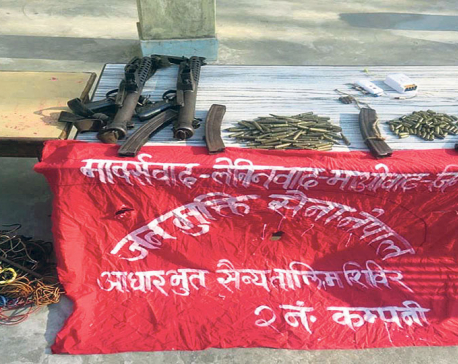
OR
Expecting mothers and new mothers found receiving less counseling on contraceptives
Published On: May 26, 2019 05:30 PM NPT By: RSS
KATHMANDU, May 26: A study conducted in six selected hospitals across the country receiving the highest expecting mothers has unveiled that many of the expecting mothers and new mothers received nominal counseling on family planning services.
The study conducted by CREHPA on the impact of institutionalizing immediate-postpartum IUD services as a routine part of antenatal counseling and delivery services in selected hospitals showed that only 25 percent of the pregnant women coming to the hospitals for routine check-up had received counseling on contraceptives and the prevalence of contraceptives among the new mothers was very dismal.
The Ministry of Health and Population has accorded priority to the program aimed at offering to counsel to the expecting mothers and new mothers on nutrition and pros and cons of contraceptives as condoms, pills, Depot, interplant and IUD and providing them contraceptive services post their delivery. Under the antenatal care program, pregnant women are advised to receive four or more times antenatal services and counseling throughout their pregnancies.
Among those receiving antenatal counseling, only 4.5 percent were found to have used IUCD, a type of long-acting reversible contraception that is inserted in the uterus of women to prevent pregnancies. In the last two decades, the number of contraceptive users has not gone up. According to the survey jointly conducted by CREHPA and Harvard School of Public Health in 2016, the prevalence of IUCD among the new mothers was at 1.4 percent.
Research coordinator Dr Mahesh Puri told RSS that the survey was conducted among 75,000 pregnant women who received antenatal and post-partum services in Bheri Regional Hospital in Nepalgunj, Lumbini Regional Hospital in Butwal, Pokhara Regional Hospital in Pokhara, Chitwan Hospital in Bharatpur, Koshi Regional Hospital in Biratnagar and BP Koirala Institution of Health and Science in Dharan. A continuous observation was made whether 22,000 new mothers had received contraceptives for 9 months and 18 months after their delivery.
The study, conducted over the three years, is considered to be the longest study on the availabilities on family planning services in Nepal new mothers in Nepal. Absence of adequate counseling Though contraceptives are the reliable means of family planning, their use is relatively low in Nepal.
Almost all means of family planning are women target and lack of adequate knowledge about the benefits and side effects among the target group, service providers failing to reach among them and absence of skilled and dedicated health workers in such service delivery system human have led to the low use of contraceptives. According to the Family Health Division, only 3.3 percent, among the married women, use Implant and 1.4 percent opt for IUCD. Only trained human resources render these services.
Only 15 percent of health institutions in the mountain and 22 percent in hill avail these services. According to the study, in the case of Nepal, less than 50 percent of health institutions are in the position of providing these family planning services. Health Ministry's former secretary Prof Dr Kiran Regmi said the sharing of knowledge about the family planning services during pregnancy would contribute to improve women's health.
Regmi indicated the weakness in government counseling services, adding that women faced additional barriers to independently decide about the use of contraceptives. It has been already three decades since the family planning programs commenced in the country, but its major indicators are stagnant for years.
Despite many efforts, the prevalence of modern contraceptives among married women is stagnant at 43 percent between 2006-2016 in Nepal and the one in four married women ( 24 5) have an unmet need for family planning. Moreover, studies show that there is a high unmet need for family planning during the postpartum period (52 percent). The knowledge that means of family planning should be used is above 90 percent. The annual expenditure of the Nepal Government in this sector is above 480 million while the international donor agencies spend over five billion.
You May Like This

Mysterious disease killing dogs in Norway
HELSINKI, Sept 8: Norwegian authorities haven’t been able to detect the cause behind an unexplained disease that is estimated to... Read More...

Right counseling needed to deal with mental problems: Psychiatrists
KATHMANDU, April 19: Appropriate and right counseling is needed for those suffering from mental problems, said psychiatrists at a program... Read More...

Govt restricts Chand group’s activities
KATHMANDU, March 13: The government on Tuesday outlawed the ‘political activities’ of the semi-underground Communist Party of Nepal led by... Read More...







Just In
- Rain shocks: On the monsoon in 2024
- Govt receives 1,658 proposals for startup loans; Minimum of 50 points required for eligibility
- Unified Socialist leader Sodari appointed Sudurpaschim CM
- One Nepali dies in UAE flood
- Madhesh Province CM Yadav expands cabinet
- 12-hour OPD service at Damauli Hospital from Thursday
- Lawmaker Dr Sharma provides Rs 2 million to children's hospital
- BFIs' lending to private sector increases by only 4.3 percent to Rs 5.087 trillion in first eight months of current FY












Leave A Comment